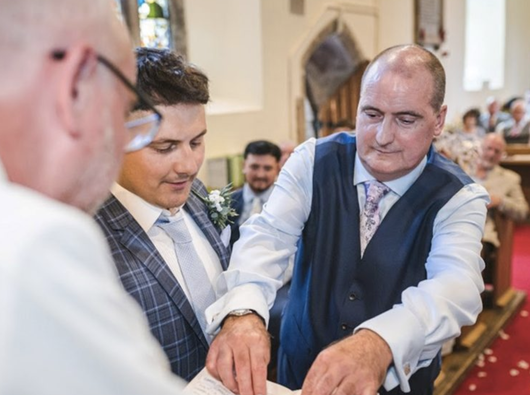Hodgkin lymphoma treatment side effects
Hodgkin lymphoma treatment can cause side effects, but everyone reacts differently. Most side effects are temporary and go away when treatment ends, but some can last longer.
Chemotherapy side effects
For most people with Hodgkin lymphoma, side effects from chemotherapy aren’t severe and they usually go away when treatment stops. They may include:
- infections and fever
- difficulty pooing (constipation)
- tiredness (fatigue)
- problems with concentration and memory (brain fog)
- cough/breathlessness
- hair loss
- bleeding and/or bruising
- anaemia (a lack of red blood cells) which can cause paleness, tiredness and breathlessness
- mouth sores
- feeling sick and being sick (nausea and vomiting)
- changes to your sense of taste
- loss of appetite
- weight changes.
Some side effects are associated with specific drugs. For example, the bleomycin drug in ABVD can cause a cough or breathlessness. Let your doctor know straight away if this happens during or after treatment.
The dacarbazine drug in ABVD may cause some pain at the spot where it’s given. If this happens there are things which can be done to help, so you should tell your nurse or doctor immediately if you feel pain.
You’ll be given drugs called anti-emetics to stop you feeling sick and to help with the vomiting you might get with certain treatments. If you still feel sick, or you have any other side effects, tell your hospital team.

Hair loss tips and stories
Find lots more information about looking after your hair during and after cancer treatment, and stories from other people who share their advice.
Side effects from steroids
Side effects from steroids can include:
- feeling agitated
- difficulty sleeping
- weight gain
- a build-up of water (water retention) around your face and ankles
- increased appetite
- raised blood sugar, particularly in people with diabetes.
Radiotherapy side effects
The side effects you might get from radiotherapy depend on the area of the body being treated. Common side effects are tiredness (fatigue), and redness in the treated area. Your hospital team will speak to you in more detail about this.
"Some side effects might feel embarrassing to talk about, like if you’ve got problems going to the loo, but do talk to the nurses. They will have seen and heard it all before, and they can help."
Lawrence, diagnosed with Hodgkin lymphoma in 2005.

Sex during treatment
It’s safe to have sex during treatment. While you’re having chemotherapy it’s important to use contraception because the drugs could harm your baby if you got pregnant. A small amount of the drugs could also be present in your body fluids. So if you’re having chemotherapy treatment you should use condoms to protect your partner, and continue to use them for a week after finishing treatment.
Once you’re in remission, talk to your doctor if you are planning to have a child. They can let you know when it’s safe to start trying for a baby.
Leanne talks frankly about sex during chemotherapy treatment
Long-term effects
Treatment for Hodgkin lymphoma can cause long-term effects. Some long-term effects get better over time while others are permanent. Some side effects can happen years later, called late effects.
Your healthcare team will explain the risks of long-term effects with any treatment they recommend. If you are at risk of long-term effects, you’ll have checks for them or be told any signs to look out for.
We talk about possible long-term effects below. Click on the headings to read about each type of long-term effect.
Treatment for Hodgkin lymphoma can affect your fertility. The level of risk depends on the specific treatment you’ve had. If you were born female, the risk to your fertility becomes higher as you get older because there is a possibility that chemotherapy may lead to an earlier menopause.
You might be able to have fertility preservation treatment before you start treatment for Hodgkin lymphoma. Your doctor or nurse can let you know if this is an option, and refer you to a fertility clinic for treatment.
It can take time to recover fully from treatment, and some people find they feel more tired than usual for a few months. We have more information about fatigue including tips that can help.
Hodgkin lymphoma and its treatment can affect your immune system, putting you at higher risk from infections. This lowered immunity can last for some time after your treatment ends.
Your doctor will usually recommend a flu jab, covid vaccines and possibly a pneumonia jab to protect you. You should wait between 6 and 24 months after finishing treatment to have any live vaccines (such as the MMR or yellow fever vaccines). Your healthcare team can let you know when it’s safe to have live vaccines.
For the rest of your life, if you need a blood transfusion you should only have blood that has been irradiated. This includes blood products such as platelets.
Irradiated blood has been treated with radiation to remove blood cells called lymphocytes. Rarely, these lymphocytes could cause a serious reaction if you’ve ever had Hodgkin lymphoma.
Your doctor should give you a card that explains this, which you can show if you need a blood transfusion or treatment in hospital. Some people also choose to wear a medical ID bracelet that says this.
In an emergency, if you need a blood transfusion to save your life, non-irradiated blood can be used so the transfusion isn’t delayed.
Treatment with chemotherapy and radiotherapy can slightly increase your risk of getting another type of cancer later in life. Treatment today is designed to reduce this risk as much as possible, and most people don’t go on to develop second cancers.
You can reduce your risk of developing a second cancer by not smoking, having a balanced diet and getting regular exercise. You should also attend any cancer screening appointments you are invited to.
Radiotherapy to the chest area can increase the risk of breast cancer. If you are at risk, you will be invited for earlier and more frequent breast screening.
Some types of chemotherapy, and radiotherapy to the chest area, can increase the risk of developing heart problems. Your doctor will carefully plan your treatment to reduce the risk of heart problems as much as possible. You may have tests before, during and after treatment to check how well your heart is working.
The chemotherapy drug bleomycin can cause changes to the lungs that can affect your breathing. Your doctor will try to reduce this risk as much as possible. If scans show your treatment is working well, they may remove the bleomycin from your next cycles of treatment.
If you smoke, quitting will reduce your risk of breathing problems.
High doses of oxygen may make breathing problems worse if you’ve had bleomycin. If you need surgery in the future tell the anaesthetist that you’ve had bleomycin. And ask your doctor if there are any activities you need to avoid such as scuba diving.
If you had radiotherapy to the neck area this can cause thyroid problems. If you are at risk of this you will usually have a blood test once a year to check your thyroid function. If you do have thyroid problems, your GP can prescribe medicine to treat them.
Getting help with side effects
Don’t feel you have to cope with side effects alone. Tell your hospital team about any side effects you have or are worried about, as there are treatments they can prescribe to reduce side effects. And if the first treatment they try doesn’t work, let them know. There are often other things they can try.
You might also find it helpful to read our information about common side effects of blood cancer treatment. It includes tips on things that can help.
Some people find it helps to talk to other people with blood cancer about side effects and share experiences and tips. You can do this on our online community forum.

Find out more about side effects
Tips and real stories about side effects like hair loss, peripheral neuropathy, brain fog, sleep problems, infection risk, nausea and sore mouth.
